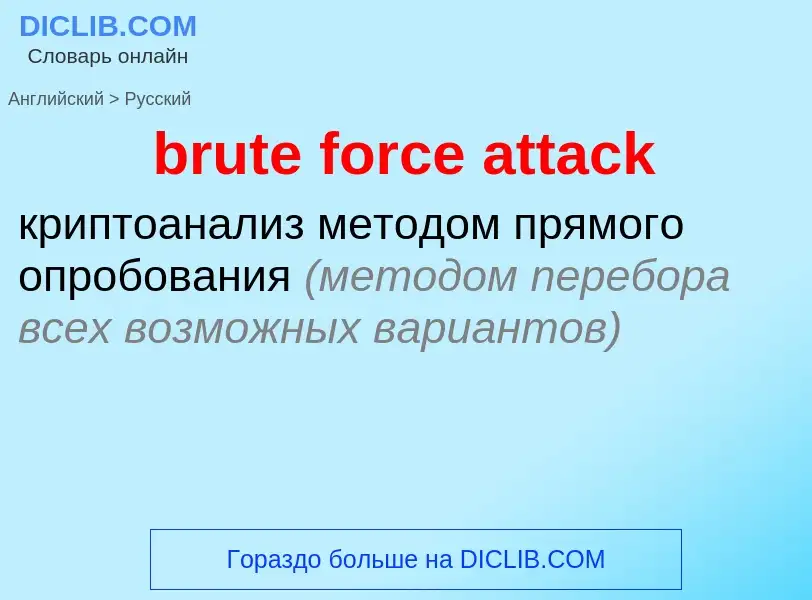Μετάφραση και ανάλυση λέξεων από την τεχνητή νοημοσύνη ChatGPT
Σε αυτήν τη σελίδα μπορείτε να λάβετε μια λεπτομερή ανάλυση μιας λέξης ή μιας φράσης, η οποία δημιουργήθηκε χρησιμοποιώντας το ChatGPT, την καλύτερη τεχνολογία τεχνητής νοημοσύνης μέχρι σήμερα:
- πώς χρησιμοποιείται η λέξη
- συχνότητα χρήσης
- χρησιμοποιείται πιο συχνά στον προφορικό ή γραπτό λόγο
- επιλογές μετάφρασης λέξεων
- παραδείγματα χρήσης (πολλές φράσεις με μετάφραση)
- ετυμολογία
brute force attack - translation to ρωσικά
общая лексика
метод грубой силы, прямой подбор, подбор [пароля] методом грубой силы
атака, заключающаяся в поиске пароля из множества всех его возможных значений путем их полного перебора. Способ подбора паролей к компьютерной системе, в котором для получения хешированных паролей используются автоматически генерируемые последовательности символов, т.е. перебираются их всевозможные комбинации до тех пор, пока пароль не будет подобран. При этом обычно учитывается наименьшая и наибольшая возможная длина пароля. Способ наиболее длительный и ресурсоемкий, кроме того, в большинстве ОС ведётся протоколирование попыток входа в систему и система закрывает пользователю вход после превышения им числа разрешенных неуспешных попыток
Смотрите также
Ορισμός
Βικιπαίδεια

In cryptography, a brute-force attack consists of an attacker submitting many passwords or passphrases with the hope of eventually guessing correctly. The attacker systematically checks all possible passwords and passphrases until the correct one is found. Alternatively, the attacker can attempt to guess the key which is typically created from the password using a key derivation function. This is known as an exhaustive key search.
A brute-force attack is a cryptanalytic attack that can, in theory, be used to attempt to decrypt any encrypted data (except for data encrypted in an information-theoretically secure manner). Such an attack might be used when it is not possible to take advantage of other weaknesses in an encryption system (if any exist) that would make the task easier.
When password-guessing, this method is very fast when used to check all short passwords, but for longer passwords other methods such as the dictionary attack are used because a brute-force search takes too long. Longer passwords, passphrases and keys have more possible values, making them exponentially more difficult to crack than shorter ones.
Brute-force attacks can be made less effective by obfuscating the data to be encoded making it more difficult for an attacker to recognize when the code has been cracked or by making the attacker do more work to test each guess. One of the measures of the strength of an encryption system is how long it would theoretically take an attacker to mount a successful brute-force attack against it.
Brute-force attacks are an application of brute-force search, the general problem-solving technique of enumerating all candidates and checking each one. The word 'hammering' is sometimes used to describe a brute-force attack, with 'anti-hammering' for countermeasures.


![GPUs]] are well-suited to the repetitive tasks associated with hardware-based password cracking GPUs]] are well-suited to the repetitive tasks associated with hardware-based password cracking](https://commons.wikimedia.org/wiki/Special:FilePath/ATI Radeon HD 5770 Graphics Card-oblique view.jpg?width=200)

